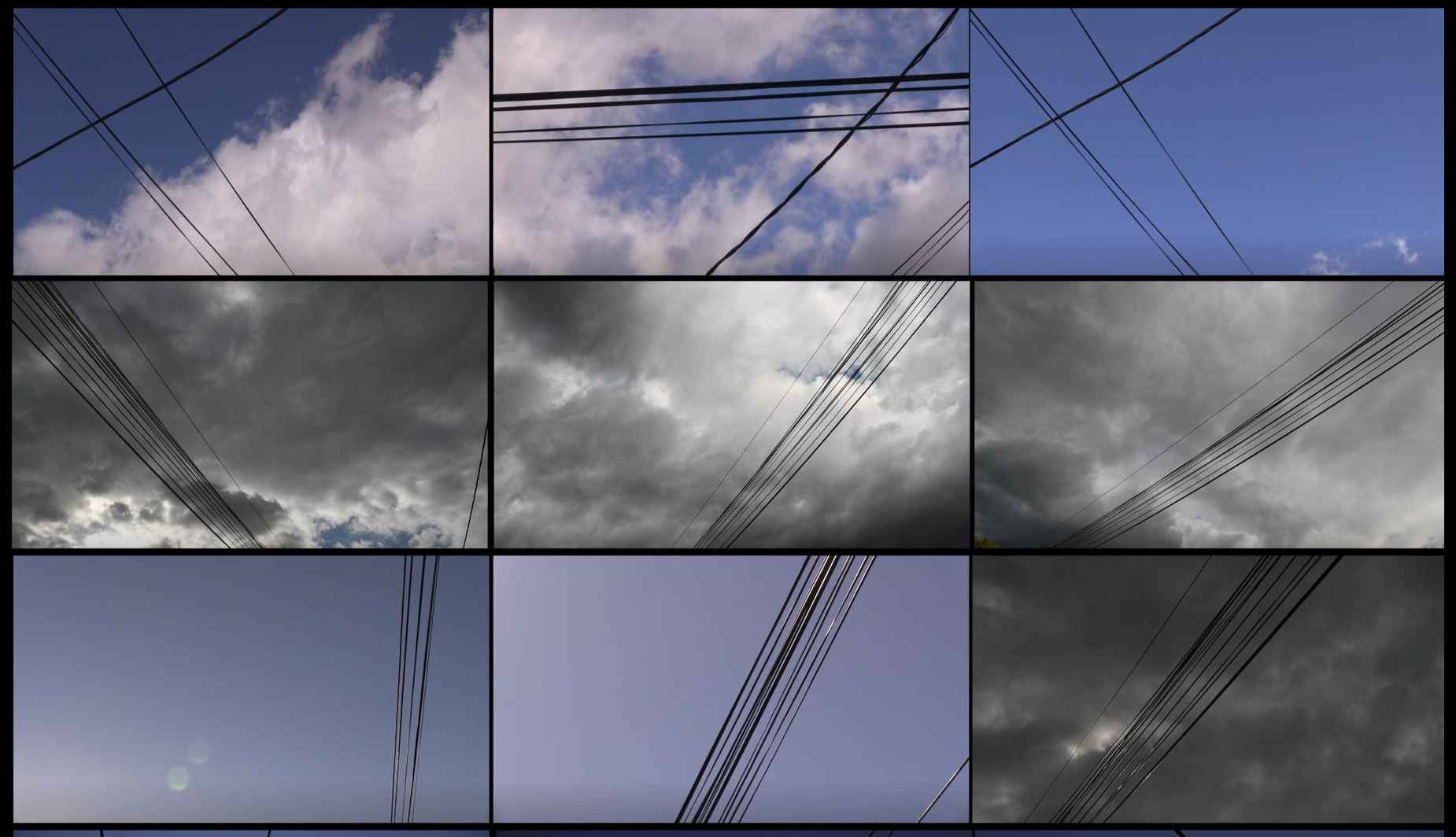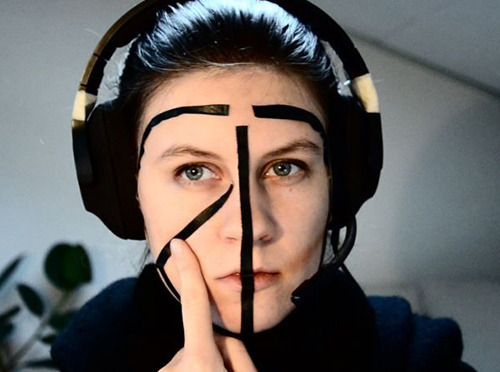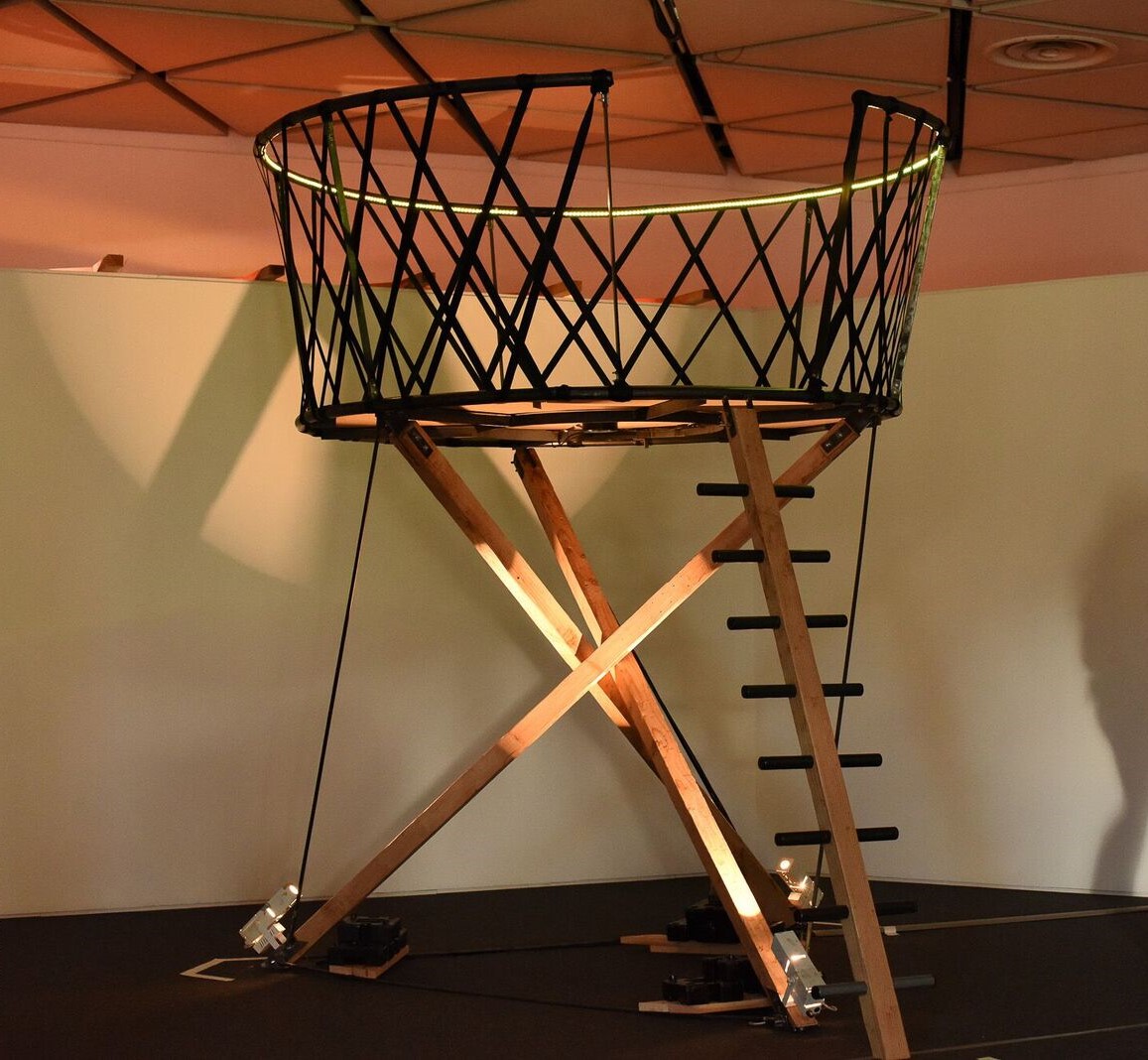

Anaïs Lossouarn (*1997, Pontoise) graduate in Fine Arts (BA) (MA), école supérieure d’Art in Aix en provence and currently in a Master Art science at Royal Academy of Art, The Hague.
My body of work concerns human dependency on technologies and the impacts that it implies.
I explore and find inspiration in the intimate links that can be built through and with digital machines.
Several of my pieces combine humor and absurdity through the juxtaposition of old and new media.
I aim to mediate attention, translate imperceptible signals, and create instruments that enhance our sensory experience based on invisible informations.
My artworks have been exhibited at festivals such as Ars Electronica (AT) (2021), Nova Festival (RO) (2022), Festival Tous courts (FR) (2022). Living and working in Haarlem, Netherlands.
SHARING A LIVING HEART
Tactile sculpture
Plaster | Metal | Polystyrene
Hydrophone | 2 mini bass shakers
I conceived this piece with the idea of making the pulsations of our hearts tactile, using a hydrophone and mini bass shaker. I wanted to find a pleasant way of coming into contact with these vibrations. To do this, I tested different materials, more or less conductive and noisy (ceramic beads, different foams). The most satisfying result was these polystyrene beads, which are soft and warm. I placed them in a cardboard box and was extremely surprised by the sensation of touching an internal organ outside my body. Several people have experienced this and had the same reaction!
I wanted to be able to extend this sensation to several people, so I came up with the idea of making this shape in plaster, so that you could slide your hand inside something unknown and have this sensation of your inner self outside, and be able to share it with someone else.
http://lossouarnanais.ovh/artscience/heartbeatselection.html
LIGNES HAUTE TENSION
Video and sound installation | 5’37’’
3-channel video
4-channel audio
Lignes haute tension is a video tryptic that focus on the aesthetic aspect of the electric cables present in the urban space.
The succession of static shots, give a possibility to the lines to extend from a screen to the other. Some flying elements move from one side to the other following variations of rhythm.
Contemplative, these videos follow the course of a luminous chronology from morning to nightfall. If certain lines are the roots of our electrical energy sources, others are the artery of our connections on digital platforms. Parts of these cables carry our virtual, invisible messages and thus play a role of bridge to our silent communications.
Walking along these electric lines with a device, I recorded electromagnetic waves signals. Initially inaudible, I used the collect of these data, to create a sound composition by translating them into sound signals.
This link between visible and invisible, perceptible and inaudible, participates to build a visual and sound landscape.
Symbol of our interconnected society, the lines are taken out of their urban context. They contrast with the background giving no sign of human activity, leaving us with a feeling of lonesomeness. The encoded sounds of private communications and the visual network transporting people’s voices and messages, make us an external spectator to these continuous exchanges.
Participative sound installation
Ceramic sculptures | Speakers | Web program
5-channel audio installation
Programming: Guillaume Stagnaro
Ear to Ear is a participative sound installation that plays a collection of secret stories told in many languages by people of different nationalities.
During the realization of this project, I went to meet many
persons in order to question the definition of the secret. These
interviews allowed me to collect various stories and reach an
intimacy with the people who revealed themselves to me.
Ceramic
ears punctuate the space, dots of color crossing the walls.
As we
approach them, we can hear voices telling these intimate stories,
lend an ear to the wall and you will share their secret lives.
In
a more secluded place, the "confessional", you are invited
to share your own secrets, fragments of your story, that will be
included in the installation and played as well through the ears
throughout the exhibition space.
INTER-FACE
Haptic and sonore online performance
Conductive paint | Microphone | Puredata program
Inter-face is a tactile and sound interface that activates by touching the face.
The conductive paint echoes a contemporary hybrid version of a tribal face paint.
Once touched, the lines start an audio recording or activate oscillating sounds
according to a predetermined score.
The skin becomes a sensitive interface making the voice resonate in a loop.
STRUCTURE OSTEOPHONIQUE
Interactive and immersive Structure
Wood | Metal | Infrabass speaker | LED |
Puredata sound and Arduino program
In collaboration with Coline Cardona and Christophe Blancard
Photos: Carlos Casteleira
Archipel319, Fondation Vaserely 2018

This osteophonic structure is inspired by the space in which it is displayed, the different geometric forms that compose it refer to the work of Vasarely. This island has the particularity of being both immersive and open, between comfort and vertigo, a place in height both intimate and sensory. When stepping onto the top, an original sound composition of infrabasses is activated to which light effects respond, associating physical and visual sensations to this new point of view. The correlation of the rhythm of the vibrations, the sound and the lights plunges us into a new contemplative state. Rather than an architecture that configures the space or a piece of furniture that stages a work, the structure is thought here as an interactive device that acts on the gaze and perception.
Cerveaux d’ort is an installation composed of
16 copies of gilded plaster brains, lying on the floor.
By
sacralizing its support, the gold, noble material, highlights the
furrows of this organ as much worshipped as questioned.
This
representation emphasizes the beauty of its plasticity but also its
virtual strength on a phylosophical level. This organ is the home of
our soul, where all the senses meet, it is the place of thought,
analysis and reflection. The point where paths converge and
reconnect.
The use of conductive materials such as gold, notably
used for electronic circuits, reminds us of the possibility of a
gateway, as a dematerialized link.
The brain and its
representation are part of the transition objects, able to create
bridges between physical and virtual, between palpable and
intangible.
This osteophonic structure is inspired by the space in which it is displayed, the different geometric forms that compose it refer to the work of Vasarely. This island has the particularity of being both immersive and open, between comfort and vertigo, a place in height both intimate and sensory. When stepping onto the top, an original sound composition of infrabasses is activated to which light effects respond, associating physical and visual sensations to this new point of view. The correlation of the rhythm of the vibrations, the sound and the lights plunges us into a new contemplative state. Rather than an architecture that configures the space or a piece of furniture that stages a work, the structure is thought here as an interactive device that acts on the gaze and perception.
LE MONDE
Newspaper and encyclopedia ashes | Glass plates
Le monde -title of a French newspaper-is a series of news papers and encyclopedias burnt to ashes. Once «cooked» in the ceramic kiln, the newspapers shrinks and whitens, resulting in ashes, piled up in layers that are both delicate and volatile.From close, the texture has a cartographic, stratified, almost geological aspect.
This violent process of burning, results in a fragile artifact of a soft radiance. The ink that has dried to depict the news and stories of everyday life is vanished to reveal a completely whitened page.
With internet expanding, the encyclopedia is a media becoming
obsolete. As an old symbol of knowledge, its symbolic still invokes
respect.
The ashes are placed on a glass plate, high enough for
the viewer to have the potential to destroy them with a single
blow.
The attention that the piece provokes by its fragility,
makes us aware of the destructive power that breath represents.
Breathing is now perceived as a danger. This echoes the strange
feeling of having to hold one’s breath or sneeze during the
pandemic period.
Eureka is a scene of two lightbulbs on their ceramic chairs, blinking as a silent conversation.
Light appears as a metaphor of idea.
The conversation is alive
and still static, the voiceless speech is transformed into
visual bursts.
Loading is a hand made of 3D printed fingers. Inspired from the music box mechanism, it recreates the movement of an impatient hand, knocking endlessly on the desk, in boredom as if waiting for something.
This machine is enslaved to repeat this gesture of impatience.
It is destined to stand unproductive and remains trapped in that
instant just before taking action.

